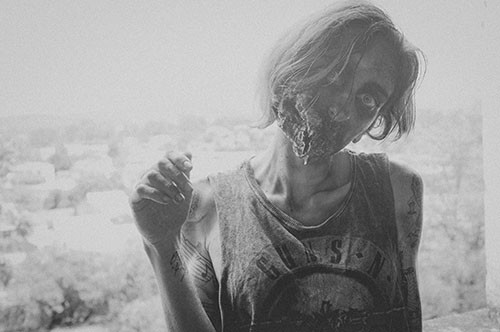Date of Discovery
1810 is the first recorded date that Zombies were introduced to text, but not in regards to the Haitian Zombies, instead to refer to a West African deity. There is an argument that the first time zombi was used to identify the living dead, was in 1819, within the context of an English poem written by Robert Southey.
The oldest evidence of their origin dates back to the Ancient Greeks, but they are certainly not referred to in the context of zombie, but instead within the fear of the dead being reanimated.
Name
The word zombie itself was actually only introduced into linguistic history as of 1871, and originated in West Africa; in Kikongo, it is zumbi, which translates to, “fetish,” wherein Kimbundu, it is nzambi, which translates to, “god.” In West Africa, zombie was the name of a snake god and only later took on the meaning of, “reanimated corpse,” with use within the voodoo religion.
The zombie goes by many different names and is seen throughout the world’s cultures. Some popular names for the zombie within the English speaking cultures are undead, the living dead, ghouls, revenants, as well as an endless supply of slang terms used within novels, television series, and movies.
In Germany they’re referred to as nachzehrer, the Romanian culture refers to them as strigoi, and the Scandinavian regions refer to them as gjenganger, or draugr.
Physical Description
Depending on the origin of the zombie, they may have slight differences in their physical appearances; as an example, the Bandage Man is considered both a ghost and a zombie, but he appears badly injured and covered in bandages from head to toe.
Within Haitian Voodoo culture the zombie is less of an undead monster and more of an automaton, or a human slave that lacks free-will, so they maintain the physical appearance that they had before becoming a zombie, save for a few details. Their physical appearance changes due to their lack of a personality, they have a blank expression and don’t respond to in any significant way, other than doing what they’re told.
Popular Horror Culture differs in great distinction, where the average zombie is a decomposed, but a reanimated human corpse, they can have dislocated, or broken limbs, as well as parts of their bodies, missing entirely. Other, more extreme versions such as the ones in movies like the Resident Evil series are mutated humans and other creatures who look in some cases look like Lovecraftian creatures.
Origin
It seems that the Ancient Greeks may have been the first to have a fear of the dead coming back to life, as archaeologists have uncovered many graves dating back to the period that contained skeletons that had been pinned into place by heavy objects, such as rocks, with the assumption that it would prevent these people from coming back from the dead.
There are two types of zombies that exist within modern lore, those who have been the victim of a voodoo curse and those who have fallen victim to a zombie virus. One predates the other, but in modern terms, the most likely scenario for a hoard of zombies and the most terrifying remains the zombie virus.
Haitian Zombies
The Haitian Zombie is derived from a West African tribal religion, which morphed into Voodoo when the religious beliefs were brought to the Americas by African slaves. The Haitian Zombie lore is derived from actual ritualistic practices within the Voodoo religion that are still practiced today, albeit not publicly and not for a cheap price. Bokors who are gifted enough to know the recipe for Zombie Powder, the powder used to drug the victim destined to be turned into a Zombie, are considered dangerous men and protect their secrets quite skillfully with their threatening demeanor and oftentimes guns.
Zombie Virus
According to popular culture, the modern zombie is either a reanimated corpse with an unmatched appetite for flesh or a person who has been bitten and consequently becomes a zombie–this is due to some type of zombie virus. This particular brand of zombie is usually portrayed as being strong, but otherwise, a mindless rotting creature who may occasionally grunt and moan, but ultimately only has one motivation–to feed. These zombies evolved from the Haitian zombie, but they were given a life of their own by the ever-changing imagination of writers who continuously try to reinvent and spark new interest in these flesh-crazed revenants.
Mythology and Lore
In Passo Marinaro, Sicily archaeologist Carrie Sulosky Weaver from the University of Pittsburgh brought to our attention that zombies are in no way a new cultural phenomenon. The evidence that they discovered goes back more than 2,000 years, but the discovery of two peculiar burials happened in the 1980s. Weaver studied two burials in particular from a necropolis in a Greek settlement on Sicily which she believes were evidence of the Greek’s belief in the dead rising from the grave. What they found was that only certain bodies had heavy stones or other objects pinning their bodies down within the grave, but her article discussed how these, “revenants could [also] be trapped within their graves by being tied, staked, flipped onto their stomachs, [or] buried exceptionally deep.”
As discussed earlier in this entry, mythology of the Haitian zombie reaches back to the West African origins of Voodoo, as do the more modern virus-spreading counterparts.
Zombies have been and will continue to be a huge part of horror culture, so much so, that the CDC came up with their own Zombie Preparedness Guide for people who might have been concerned about being overrun by the undead.
Articles Featured on Puzzle Box Horror
Original Fiction From Puzzle Box Horror
Modern Pop-Culture References
Books & Literature
- The Serpent and the Rainbow (1985)
- The Zombie Survival Guide (2003)
- The Walking Dead (2003 – 2019)
- Pride and Prejudice and Zombies (2009)
Movies
- White Zombie (1932)
- Night of the Living Dead (1968)
- The Serpent and the Rainbow (1988)
- 28 Days Later (2002)
- Resident Evil (2002)
- Shaun of the Dead (2004)
- Resident Evil: Apocalypse (2004)
- Resident Evil: Extinction (2007)
- 28 Weeks Later (2007)
- Zombieland (2009)
- Resident Evil: Afterlife (2010)
- Resident Evil: Retribution (2012)
- World War Z (2013)
- Resident Evil: The Final Chapter (2016)
- Pride and Prejudice and Zombies (2016)
Television Series
- The Walking Dead (2010 – )
- Talking Dead (2011 – )
- Fear the Walking Dead (2015 – )
Is there anything we missed about zombies? Let us know in the comments section below!



